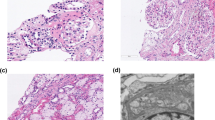Abstract
Hyperuricemia and secondary urate nephropathy are uncommon in the paediatric setting outside of tumour lysis syndrome. We describe the case of a 12-year-old boy who presented at 3 years of age with acute renal failure. The cause of this remained unknown until the development of uric acid renal calculi 9 years later. This, and the availability of the previously unknown family history, provided the subsequent diagnosis of partial hypoxanthine-guanine phosphoribosyltransferase (HPRT) deficiency. Detailed family history is important for early detection of this heterogeneous group of disorders. Early treatment may minimise long-term renal morbidity and mortality from renal insufficiency.

Similar content being viewed by others
References
Jinnah H, Friedmann T (2001) Lesch-Nyhan disease and its variants. In: Scriver CR (ed) The metabolic and molecular bases of inherited disease, vol 2, 8th edn. McGraw-Hill, New York, pp 2357–2561
Mateos F, Puig J (1994) Purine metabolism in Lesch-Nyhan syndrome versus Kelley-Seegmiller syndrome. J Inherit Metab Dis 17:138–142
Mak BS, Chi C-S, Tsai C-R, Lee W-J, Lin H-Y (2000) New mutations of the HPRT gene in Lesch-Nyhan syndrome. Pediatr Neurol 23:332–335
Hersh JH, Page T, Hand ME, Seegmiller EJ, Nyhan WL, Weisskopf B (1986) Clinical correlations in partial hypoxanthine guanine phosphoribosyltransferase deficiency. Pediatr Neurol 2:302–304
Wilcox W (1996) Abnormal serum uric acid levels in children. J Pediatr 128:731–741
Harkness R, McCreanor G, Greenwood R (1991) The pathogenesis of the Lesch-Nyhan syndrome: ATP use is positively related to hypoxanthine supply to hypoxanthine guanine phosphoribosyltransferase. J Inherit Metab Dis 14:202–214
Srivastava T, O’Neill JP, Dasouki M, Simckes AM (2002) Childhood hyperuricemia and acute renal failure resulting from a missense mutation in the HPRT gene. Am J Med Genet 108:219–222
Kang DH, Nakagawa T, Feng L, Watanabe S, Han L, Mazzali M, Truong L, Harris R, Johnson RJ (2002) A role for uric acid in the progression of renal disease. J Am Soc Nephrol 13:2888–2897
Simmonds H, Cameron J, Barratt T, Dillon M, Meadow S, Trompeter R (1989) Purine enzyme defects as a cause of acute renal failure in childhood. Pediatr Nephrol 3:433–437
Duran M, Dorland L, Meuleman E, Allers P, Berger R (1997) Inherited defects of purine and pyrimidine metabolism: laboratory methods for diagnosis. J Inherit Metab Dis 20:227–236
Augoustides-Savvopoulou P, Papachristou F, Fairbanks L, Dimitrakopoulos K, Marinaki A, Simmonds H (2002)Partial hypoxanthine-guanine phosphoribosyltransferase deficiency as the unsuspected cause of renal disease spanning three generations: a cautionary tale. Pediatrics 109:E17
Acknowledgments
We would like to thank Dr Barry Lewis (Biochemist, Princess Margaret Hospital, Perth, Western Australia) for his assistance with biochemical testing of the family.
Author information
Authors and Affiliations
Corresponding author
Rights and permissions
About this article
Cite this article
Cherian, S., Crompton, C.H. Partial hypoxanthine-guanine phosphoribosyltransferase deficiency presenting as acute renal failure. Pediatr Nephrol 20, 1811–1813 (2005). https://doi.org/10.1007/s00467-005-2065-8
Received:
Revised:
Accepted:
Published:
Issue Date:
DOI: https://doi.org/10.1007/s00467-005-2065-8




